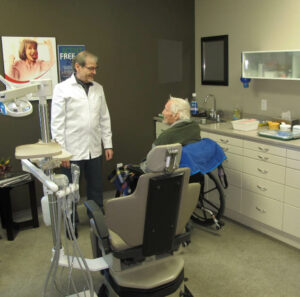When this question was posed to a group of young people, their answers included:
Everybody needs dentures when they get old.
• Dentures click when you talk, just like my grandpa’s.
• You can’t chew bubble gum when you wear dentures.
• I hope I never need them, because my aunt takes hers out when she eats.
Dentures are often pictured sitting in a glass on a nightstand, the sideline for jokes. However, they are no laughing matter. The WorldHealth Organization considers people who are missing all natural teeth (edentulous) as people with a physical handicap. Proper chewing and the ability to eat a
The latest federal figures indicate that one in five Canadians over the age of 60 – more than one million people – have no natural teeth*.
Even though dentures are the most common prosthesis worn worldwide, they are one of the most misunderstood and undervalued.
Dentures impact a person’s self-esteem,dignity,confidence,nutritional intake,chewing,digestion, phonetics (speech), facial muscle support (appearance) and intimacy.
The good news is that keeping most, if not all of your natural teeth, well into your senior years is possible with today’s preventative dental care. This includes a good home care routine (yes, this includes flossing), good
However, if you find yourself requiring a denture it may be due to a variety of causes out of your control, such as genetic predisposition,socio-economics, trauma or nutrition that
With today’s technologies
To illustrate advancements in other medical areas let us recall the prosthesis worn by the fictional character Captain Ahab inMoby Dick (1851 classic), a ‘peg-leg’ carved out of whalebone that allowed him limited motion. He walked with a limp and the ‘leg’ could not bend. This technology is a far cry from that utilized for the first time in Olympic history by double amputee Oscar Pistorius, as he used the most advanced design and material technology to run into the history books during the 2012 Olympic games. What an amazing advancement in artificial limb technology!
Just as this technology has come a longway over the last few decades, so has denture and dental implant technology.
Materials, equipment and techniques have all undergone significant improvements.
Nevertheless, dentures are still a prosthetic and like any prosthetic, it will take time to adapt to change. Some people who haveartificial limbs may initially go through months of physiotherapy to become proficient withtheir prosthesis; the same time frame could beexpected for a denture wearer,
At Nancy Tomkins and Associates Implant and Denture Clinic we work closely with you
Call Teresa for a consultation
(*The Canadian Press: Nov 7, 2011)


